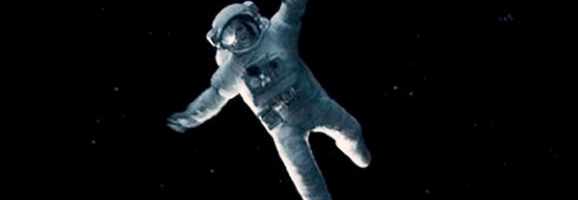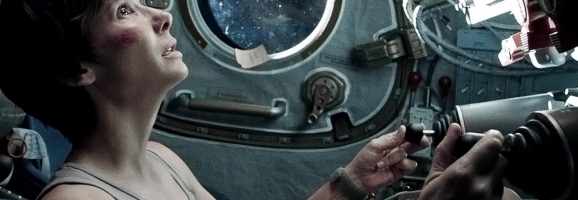Sound and Silence in ‘Gravity’: In Space, No One Can Hear You…

Among the slew of Oscar nominations Alfonso Cuaron’s space thriller Gravity has received are three for its sound: Best Original Score, Best Sound Editing and Best Sound Mixing. A beautiful 3D spectacle, the film was heralded upon its release for its stunning cinematography and impressive visual effects, yet despite these impressive features, I would argue that it is with the film’s sound-scape that the film-makers were at their most accomplished.
Gravity is a film which, from the get-go, establishes the importance of sound. A pre-title statement declares:
At 372 miles above the Earth
There is nothing to carry sound
No air pressure
No oxygen
Life in space is impossible
It is interesting to note that, after an opening statement about no sound, this is a film which ultimately surrounds us in the importance of it. As the film title appears on screen, a cacophonous wall of sound rises in volume steadily; it reaches a crescendo of loud, almost unbearable noise, before stopping to give way to sheer silence. With such a sharp edit, the silence comes to feel as loud as the noise. Here is where we first see, and hear, the vast emptiness of space.

“What is you like most about being up here?” George Clooney’s Matt Kowalsky asks our heroine Ryan Stone (Sandra Bullock) close to the beginning of the film. “The silence. I could get used to it.” is of course her reply. This short answer from Ryan will serve to define part of her character throughout the remainder of the film, as she will ironically begin to desperately search for and crave sound.
As Ryan works on the Hubble telescope at the start of the film, she is surrounded by several noisy distractions. Matt Kowalsky is particularly talkative, with tales of his unfaithful wife and a hairy man at Mardi Gras. Houston is hounding her with questions about her health. Music is also playing throughout, in response to which she asks the NASA communicator to turn it off. She wants silence.
Ryan’s initial affinity with the silence of space is an important starting point for her character development. In one scene, while in conversation with Kowalsky, Stone speaks about what she would be doing on Earth at that time. She listened to the radio. In an attempt to escape her thoughts on Earth, she surrounded herself with sound as a distraction; now in space she seeks silence.
Ryan’s main motivation is searching for an escape. We get the impression that the tragedy in her life was so great it has led her to drastically seek distance from it – and how much more distant can you get than in outer space? In learning to face her past and move on, sound is an important tool. Silence soon becomes her enemy as she is left stranded and alone in her womb-like airlock. Like an in-utero child not wanting to leave the safety and calm of her mother’s womb (childbirth and gestation being primary themes within the film), Ryan is an avoidant character. Scared and overwhelmed by the circumstances thrown her way, she wants to hide herself away in a soundless bubble. This avoidance leads to torment however. As stated earlier, on Earth Ryan used sound to help her block out negative thoughts relating to the death of her daughter. Now, in lonely and quiet space, she cannot help but face her past.
The sound design throughout the film cleverly gives us glimpses into the harshness of pure silence. It says a lot about a score when it evokes the correct emotions, yet can seemingly also go almost unnoticed. It is easy to miss the constant presence of sound in a film, and so when the film then confronts you with a wall of silence (one particularly evocative example in Gravity being when the door of Stone’s airlock is opened, “letting in” the silence from outside) we realise that a lack of sound can be as abrasive as the loudest of volumes.

Ryan’s desire for sound becomes more apparent as she desperately seeks communication from her fellow workers and NASA. In one scene she renders herself hoarse by repeatedly asking for a response from Houston. When sound begins to filter through the speakers, she soon realises she is receiving a signal from Earth. In the vast silence of space, her one connection back home is through sound. Ryan contacts a Chinese man singing a lullaby, and upon hearing such sound is not only comforted but reminded of what she is cutting herself off from. In trying to avoid the pain of her loss, she has restricted herself from experiencing the joy of life, and the comfort of people. It is this sound, and this communication with another human being, which begins to thrust the astronaut back into action. In a touching moment, Stone begins howling loudly like one of the dogs she can hear through the radio. Her sheer inhibition is affecting, it is indicative of her desire to now make a mark, a sound, but in space no one can hear you howl.
Another sound filtering through the radio is that of a baby crying. This moment comes to represent everything she was seeking to escape from on Earth, and serves to compel her forward in the final act of the film. In the lonely silence, the sounds of Earth are her biggest comfort and motivation. At the conclusion of the film, Ryan seems to be “re-born” in a burst of sound. She is surrounded by noise in a complete contrast to the silence of space.
Like a baby emerging from the womb into the chaos of the world, Ryan has chosen to embrace life and all the intimidating sounds that come with it.
What do you think? Leave a comment.











I found the score was typically bombastic. It told viewers what to think and to feel before, during, and after events. It was clichéd, repetitive and highly manipulative.
I know about the composer’s work to find original sounds, and props to him for doing so. I also heard, and appreciated, his brassy motif, which replayed from time to time, mostly in the first half. It was spare, but most effective, in the haunting, nerve-jangly way of the Jaws theme. But these qualities were pounded out of recognition by the full-on orchestration treatment, catering to homogenized taste.
Well, thanks for your thoughts, we can’t all agree!
The thing that struck me most about the use of sound in the film wasn’t any particular innovation with the score but rather how the sound-scape was particularly important in demonstrating Ryan’s journey, and how it was an appropriate representation of her distance from, and return to, Earth.
The use of silence, as opposed to sound, impressed me. The “typically bombastic” score, as you describe it, served its purpose during action scenes, as you will find in any blockbuster film. But it also served to contrast harshly with the moments of sudden silence. Personally, I found it to be quite emotionally evocative and was one particular thing I came away from the film having especially enjoyed.
I agree. I think that the score is quite effective. I’ve listened to it a few times since seeing the film, and I noticed that there is a “pulse” to it. It tends to soften and expand to the rhythms of the body; and the pulse becomes most intense in the moments of highest anxiety. I guess you can say that about a lot of film music, but in this case in particular, I feel that the music is a perfectly-synced visceral expression of the main character’s inner turmoil.
Many commenters seem to conflate score with sound. There can be a complete absence of score and still be plenty of noise in a film. The use of score in Gravity might be sensitive and appropriate, but it’s the clever use of actual silence that sets it apart. This is a nicely written piece about just that.
Gravity is definitely the first film I’ve seen in a while that uses silence correctly. Reading the article made me recall seeing the film in IMAX and just sitting in front of a 70′ x 90′ screen and taking in the silence. I was amazed sitting among 500 people and sharing this simulation of space. It’s very easy to blast music and sounds to make something appear “film like” but it’s a real art to use silence to your advantage.
I completely agree. The greatest moments are found in the stillness. We’re starting to see a lot of movies that are grounded in realism veer away from using music but not many of them have accomplished the magic of finding the perfect still moment in which there is nothing but the character to fill that space.
I agree, but to be fair, using true silence is very difficult, and in reality things are seldom silent. Often sounds associated with emptiness and quiet are not silence at all but subtle sounds like wind, or your own breathing etc. I also wonder if sound technology had to reach a certain quality, and even audiences reach a certain level of maturity for this to be possible. I’ll have to rematch A Space Odyssey now…
I loved the score. Very intense, heightened the drama. A score is supposed to evoke an emotional reaction and it did that very well.
Imo it’s really good music but it is a bit heavy-handed in some areas. The music played during the first encounter with the debris field is awesome. The music in the final scene made me cringe at its predictable and overblown nature.
I score should support a film, not bombard you with unsubtle cues at every opportunity.
The score was a very good one, finally a synthetic action score which is not a direct MV copy. It was a fresh approach and it’s getting the recognition it deserves. What I can’t imagine is this film without the score. It’s already an almost silent film. Since the director could not use sound effects for almost anything happening on screen, he had to rely on the score to create the dramatic tension and to act like a sound effects track.
I can imagine this film without most of its score, and imagine it being the better for it. I would have appreciated the confidence to stick to the power of a few instruments, including non-traditional sources, rather than rely on the routine wash of sound that overwhelmed and undermined the potential of the score’s essential elements, intimated in the picture’s first third.
I have yet to see the film, but my interest in sound and it’s effect in film coupled with this very good article means I will be seeing it soon.
Thanks.
You are very welcome! I really hope you enjoy the film.
Loved the use of sound in this film, particularly how it was used to mix elements of the horror genre into the story. I find the reference of Alien in your title quite fitting for this particular topic.
This was my favorite movie of 2013.
I’m one of the few people who didn’t care for Gravity. This is an analysis that’s interesting on its own, however — the use of sound and silence is far more appealing than the pretty simplistic plot line of the movie. I couldn’t get past why the heck George Clooney was in it at all.
I’d be interested to hear what you think of the use of silence in Up, where silence is an important element, as well.
Definitely agree, though I’m not sure that Up uses silence in the same way.
I never really thought of the silence used in that way, you make very good points all around. Cauron definitely had a different use for the silence in this film and it was interesting seeing what you had to say about it
Good read on the film, I personally thought Sandra Bullock was hard to watch, and with it just being her onscreen most of the time, I thought the picture was lacking.
I also agree with this. One of my main complaints after seeing Gravity was that I didn’t care about her. I know a lot of other people who have said the same thing too. Great article though, you’ve picked out the elements that made the film enjoyable for me.
I had never thought about Gravity this way. It makes complete sense now, and very good job!
The best component of Gravity, in my opinion, was the CGI effects. Unfortunately Sandra Bullock’s performance ruined the majority of the movie for me. I simply thought her acting was terrible and her emotional acting catastrophic. Good article though, nice read!
*Cuarón